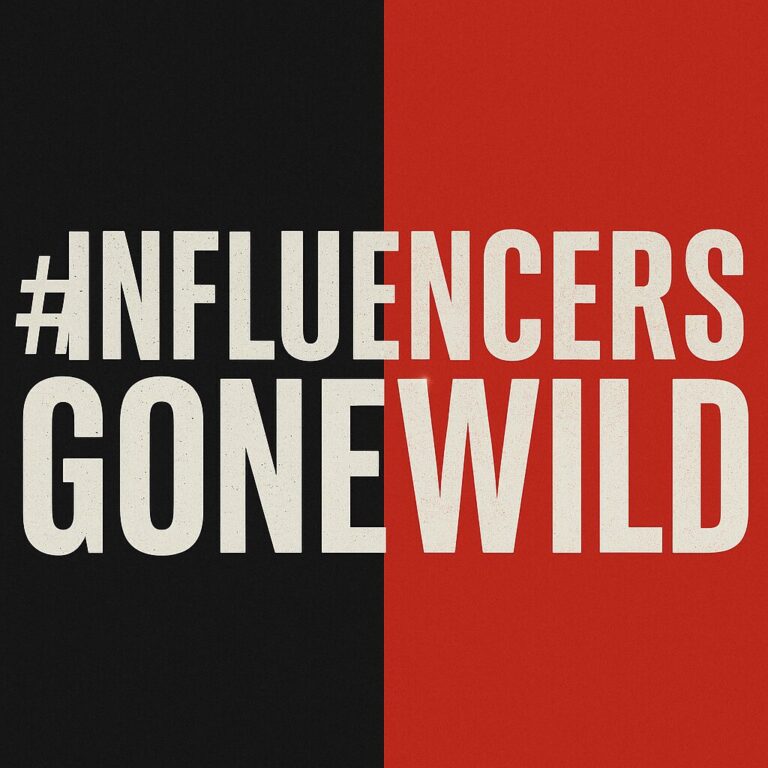It started, like most things do these days, with a shaky video and a caption that begged to be shared: “She really said that… off-camera.” Within hours, the hashtag #InfluencersGoneWild was trending, not for glamor or inspiration, but because someone caught an influencer acting nothing like their online persona.
What followed was a cascade. More videos. More stories. More revelations. One creator was seen berating a waiter. Another staged a fake “candid” proposal. A wellness guru was caught chain-smoking behind a yoga studio. And while internet pile-ons aren’t new, this time the commentary felt sharper, the stakes a little higher. Not just about hypocrisy, but about how well we really know the people we watch, emulate, and follow.
The Mask of the Persona
Influencers trade in perception. That’s the product. Whether it’s health, success, relationships, or happiness, the goal is to appear like the living embodiment of something aspirational.
We know this. We’ve always known this.
But #InfluencersGoneWild has reopened an old wound. Our discomfort with just how blurred the line between authenticity and performance has become.
The curated perfection of social media is hardly news. Platforms reward dopamine-hitting content: neatly filtered images, carefully scripted advice, spontaneous moments that took three hours and a tripod to shoot. But the backlash behind this hashtag isn’t just about inauthenticity. It’s about betrayal. About how we feel when someone we trusted to be “real” turns out to be rehearsed, rehearsed, rehearsed.
Parasocial Fatigue
What makes this sting isn’t that people lie online. That’s a given. What hurts is the emotional contract we’ve been tricked into signing.
Parasocial relationships—the one-sided intimacy people develop with media personalities—aren’t inherently bad. In fact, they can be stabilizing. Studies from the University of Kansas show these bonds often provide comfort during lonely or transitional phases. But they rely on illusion. On trust.
So when an influencer gets caught acting like a jerk or staging content for engagement, it’s not just the illusion that shatters. It’s the emotional investment we made in them. It’s the hours spent listening to their podcasts, saving their skincare routines, copying their morning affirmations. We didn’t just believe the product. We believed the person.
That’s where the fury comes from. Betrayal.
Fame Without Infrastructure
Here’s something we don’t talk about enough: influencers are famous without any of the traditional buffers fame used to come with.
In the past, celebrities had teams. Agents, managers, media training. Their public image was a collaborative, guarded effort. Most influencers were DIY fame-machines. No PR coach. No crisis handler. Just ring lights and intuition.
When they implode, it’s often unfiltered and amateur. And the results feel raw. Messy. Uncalculated.
This is part of what makes #InfluencersGoneWild so addictive. There’s a grim fascination in watching someone lose control of the very image they built so carefully. We’re not just witnessing the fall. We’re watching them fumble the landing in real time.
The Economics of Outrage
Let’s talk about the machinery behind all of this.
Outrage fuels algorithms. Viral moments, especially the scandalous kind—drive engagement, comments, shares. Influencers may be caught “off-brand,” but the people posting the exposés often have brands of their own. And they benefit. A TikToker who records an influencer screaming at a barista might get more views in a day than in the last six months combined.
In other words, clout is currency. Even when it’s earned by exposing someone else’s downfall.
And that begs the question: are we holding influencers accountable, or are we just feeding a system that thrives on public shaming?
Moral Collapse in the Comments Section
Every InfluencersGoneWild video comes with its own ecosystem of comments. Some people defend. Some people attack. But the larger theme is always moral. Did they deserve it? Are they cancelled? Can they come back?
It’s the modern version of gladiator combat. Except now, the arena is your phone, and the audience decides your fate through swipe and scroll.
There’s a dangerous satisfaction in it. Schadenfreude wrapped in social justice language. We convince ourselves we’re calling out bad behavior, but often we’re just indulging a collective appetite for humiliation.
We say we want authenticity. But what we really crave is drama. And the internet is more than happy to serve it.
The Problem With “Being Real”
Some influencers tried to fight back. They posted emotional apologies. Livestreamed their explanations. Doubled down on their “realness.” But the damage was done. Once the spell breaks, it’s hard to put it back together.
The truth is, “being real” online is often just another layer of performance. It’s vulnerability with lighting. Confessions edited for maximum relatability.
One influencer was caught faking a panic attack on camera. Another one cried over her backlash while still using a branded filter. And the audience noticed.
And in that gap between what we see and what we sense, trust erodes.
The New Influencer Equation
So where do we go from here?
Maybe this isn’t the death of influencing, but a pivot point. The smartest creators have already started adapting. Smaller followings. More niche content. Less polish. They don’t try to be perfect. They don’t preach. They don’t manufacture intimacy.
Instead, they share expertise. They acknowledge limits. They’re less about being someone you want to be and more about being someone you can learn from.
That shift matters. It separates influence from identity. And in a post-#InfluencersGoneWild world, that might be the only path left to credibility.
What This Tells Us About Ourselves
Maybe the real story isn’t about influencers at all. Maybe it’s about us.
We created this ecosystem. We rewarded polished perfection. We bought the products, clicked the links, mimicked the poses. And now we’re angry it wasn’t real.
There’s a lesson in that. About projection. About desire. About the dangers of mistaking content for character.
But there’s also room here. For reflection. For recalibration. For letting people be people again, without expecting them to embody the ideals we don’t even live up to ourselves.
Because when the cameras stop rolling, everyone is a little messier than they seem online.
Some of us just have the privilege of doing it in private.



